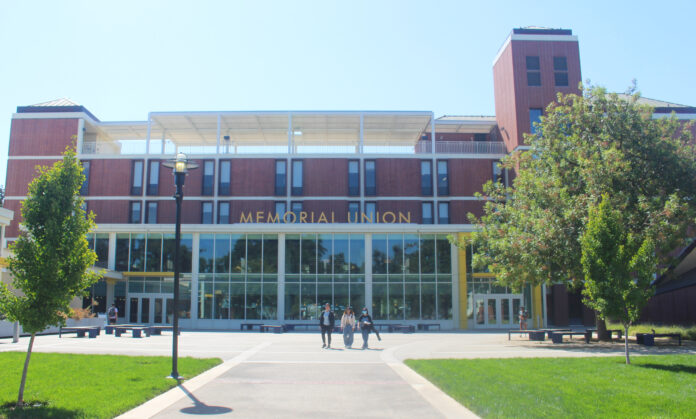ASUCD senators discuss goals and student engagement opportunities for the new school year
By LILY FREEMAN — campus@theaggie.org
A new school year brings a newly elected ASUCD Senate. The legislative branch of ASUCD is led by the Senate, which supports six commissions and several committees.
Erek Leschyn, a fourth-year political science major and an ASUCD senator, described the role of the Senate on campus.
“The biggest thing that ASUCD senators do is act as a liaison between ASUCD’s governing body, other ASUCD units and students,” Leschyn said. “Each senator will adopt different units and join different committees to see what kind of support they need, and bring that information back to the table to craft bills.”
ASUCD manages a 19 million dollar budget and funds several of the services that students use on a daily basis, according to Leschyn.
“Whether it’s Unitrans, the Pantry, Aggie Reuse or the CoHo, a lot of students use the services that we provide,” Leschyn said. “Many perhaps don’t even realize that all of those operations are paid for by student fees and are monitored by the Senate.”
The California Aggie is also partially funded through ASUCD.
Third-year international relations and Middle East/South Asia studies double major and ASUCD senator Gabriel Gaysinsky also explained the impact that the Senate’s activities have on students.
“ASUCD is funded through student fees that are taken directly from your tuition,” Gaysinsky said. “The power we have is derived from these funds, and as elected members of the Senate, we are able to utilize these funds in the various bills we pass.”
Gaysinsky went on to describe how students can ensure that their voices are heard by the Senate.
“The main thing is voting,” Gaysinsky said. “The voter turnout is abysmally low. It’s gotten as low as maybe six percent in recent years, which is just terrible. Anyone that studies how democracies function would understand that the lower the turnout, the worse the democracy.”
Gaysinsky went on to highlight that because of the low voter turnout in recent elections, the Senate has a goal to increase student engagement efforts this year.
“There’s a complete and utter lack of outreach, and most people don’t know anything about the Senate,” Gaysinsky said. “The best way to get students involved is to engage with them more and [for] students to demand that senators increase their presence.”
Leschyn offered an additional method for students to voice their opinions to the Senate.
“All senators are required to have office hours,” Leschyn said. “Their office hours should be listed in the ASUCD roster. This gives students the opportunity to individually discuss their thoughts one-on-one with the senators.”
Dani Antonio, a fourth-year political science and psychology double major and ASUCD senator, said that ASUCD tabling is also an effective way to reach the senators.
“If you see an ASUCD table, don’t be afraid to come up to us,” Antonio said. “We are there for you, and it is the perfect opportunity to quickly ask your senators questions, voice your concerns or discover how to get involved.”
Antonio also emphasized social media as a tool to interact with senators, where every senator has an Instagram account for students to reach them virtually.
Gaysinsky concluded with how students can get involved with ASUCD and the Senate through both volunteer and paid positions.
“The main way that students can get involved is through ASUCD’s vacancies website, vacancy.ucdavis.edu, where new positions are put up frequently,” Gaysinsky said. “It’s the best way to get involved, and it’s how I started. I joined the Ethnic and Cultural Affairs Commission through the website, and that experience allowed me to run for Senate. Because we have a number of different focuses, you can do something you actually believe in.”
Written by: Lily Freeman — campus@theaggie.org










